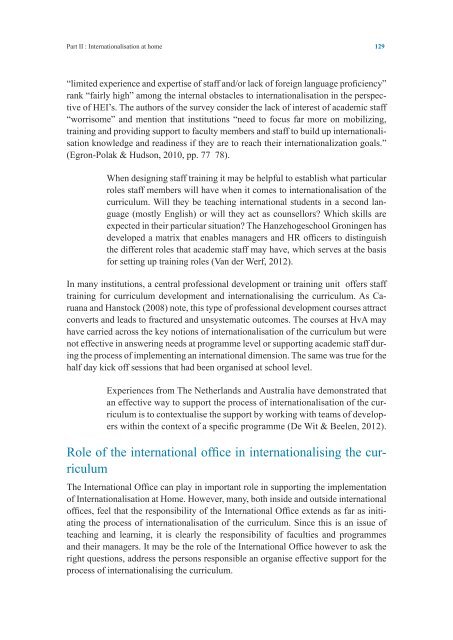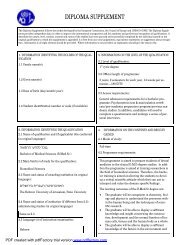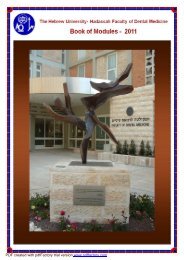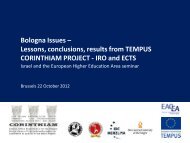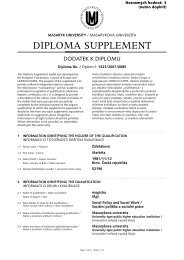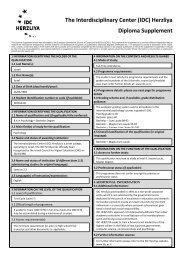- Page 1:
Guide of Good PracticesTEMPUS CORIN
- Page 4 and 5:
ISBN: 978-84-695-6409-7Depósito Le
- Page 7 and 8:
Guide of Good PracticesTEMPUS CORIN
- Page 9 and 10:
Samira A. Barghouthi.Samira A. Barg
- Page 11:
ing. Since 2007 he is involved in s
- Page 14 and 15:
Chapter 4: Quality of International
- Page 16 and 17:
14Guide of Good Practices TEMPUS CO
- Page 19 and 20:
Part I : Quality of Internationalis
- Page 21 and 22:
Part I : Quality of Internationalis
- Page 23 and 24:
Part I : Quality of Internationalis
- Page 25 and 26:
Part I : Quality of Internationalis
- Page 27 and 28:
Part I : Quality of Internationalis
- Page 29 and 30:
Part I : Quality of Internationalis
- Page 31 and 32:
Part I : Quality of Internationalis
- Page 33:
Part I : Quality of Internationalis
- Page 36 and 37:
34Guide of Good Practices TEMPUS CO
- Page 38 and 39:
36Guide of Good Practices TEMPUS CO
- Page 40 and 41:
38Guide of Good Practices TEMPUS CO
- Page 42 and 43:
40Guide of Good Practices TEMPUS CO
- Page 44 and 45:
42Guide of Good Practices TEMPUS CO
- Page 46 and 47:
44Guide of Good Practices TEMPUS CO
- Page 48 and 49:
46Guide of Good Practices TEMPUS CO
- Page 50 and 51:
48Guide of Good Practices TEMPUS CO
- Page 52 and 53:
50Guide of Good Practices TEMPUS CO
- Page 54 and 55:
52Guide of Good Practices TEMPUS CO
- Page 56 and 57:
54Guide of Good Practices TEMPUS CO
- Page 58 and 59:
56Guide of Good Practices TEMPUS CO
- Page 61 and 62:
Part I : Quality of Internationaliz
- Page 63 and 64:
Part I : Quality of Internationalis
- Page 65 and 66:
Part I : Quality of Internationalis
- Page 67 and 68:
Part I : Quality of Internationalis
- Page 69 and 70:
Part I : Quality of Internationalis
- Page 71:
Part I : Quality of Internationalis
- Page 74 and 75:
72Guide of Good Practices TEMPUS CO
- Page 76 and 77:
74Guide of Good Practices TEMPUS CO
- Page 78 and 79:
76Guide of Good Practices TEMPUS CO
- Page 80 and 81: 78Guide of Good Practices TEMPUS CO
- Page 82 and 83: 80Guide of Good Practices TEMPUS CO
- Page 84 and 85: 82Guide of Good Practices TEMPUS CO
- Page 86 and 87: 84Guide of Good Practices TEMPUS CO
- Page 88 and 89: 86Guide of Good Practices TEMPUS CO
- Page 90 and 91: 88Guide of Good Practices TEMPUS CO
- Page 92 and 93: 90Guide of Good Practices TEMPUS CO
- Page 94 and 95: 92Guide of Good Practices TEMPUS CO
- Page 96 and 97: 94Guide of Good Practices TEMPUS CO
- Page 99 and 100: Part I : Quality of Internationalis
- Page 101 and 102: Part I : Quality of Internationalis
- Page 103 and 104: Part I : Quality of Internationalis
- Page 105 and 106: Part I : Quality of Internationalis
- Page 107 and 108: Part I : Quality of Internationalis
- Page 109 and 110: Part I : Quality of Internationalis
- Page 111: Part I : Quality of Internationalis
- Page 114 and 115: CollaboratorsABUZAHRA, Nimer A.Hebr
- Page 116 and 117: eceived the 2009 Andrew Heiskell Aw
- Page 119: AcknowledgementsMy experience with
- Page 122 and 123: 120Guide of Good Practices TEMPUS C
- Page 125 and 126: Part II : Internationalisation at h
- Page 127 and 128: Part II : Internationalisation at h
- Page 129: Part II : Internationalisation at h
- Page 133: Part II : Internationalisation at h
- Page 136 and 137: 134Guide of Good Practices TEMPUS C
- Page 138 and 139: 136Guide of Good Practices TEMPUS C
- Page 140 and 141: 138Guide of Good Practices TEMPUS C
- Page 142 and 143: 140Guide of Good Practices TEMPUS C
- Page 144 and 145: 142Guide of Good Practices TEMPUS C
- Page 146 and 147: 144Guide of Good Practices TEMPUS C
- Page 149 and 150: Part II : Internationalisation at h
- Page 151 and 152: Part II : Internationalisation at h
- Page 153 and 154: Part II : Internationalisation at h
- Page 155: Part II : Internationalisation at h
- Page 158 and 159: 156Guide of Good Practices TEMPUS C
- Page 160 and 161: 158Guide of Good Practices TEMPUS C
- Page 162 and 163: 160Guide of Good Practices TEMPUS C
- Page 164 and 165: 162Guide of Good Practices TEMPUS C
- Page 166 and 167: 164Guide of Good Practices TEMPUS C
- Page 168 and 169: 166Guide of Good Practices TEMPUS C
- Page 170 and 171: 168Guide of Good Practices TEMPUS C
- Page 172 and 173: 170Guide of Good Practices TEMPUS C
- Page 174 and 175: 172Guide of Good Practices TEMPUS C
- Page 176 and 177: 174Guide of Good Practices TEMPUS C
- Page 179 and 180: Part II : Internationalisation at h
- Page 181 and 182:
Part II : Internationalisation at h
- Page 183 and 184:
Part II : Internationalisation at h
- Page 185 and 186:
Part II : Internationalisation at h
- Page 187 and 188:
Part II : Internationalisation at h
- Page 189 and 190:
Part II : Internationalisation at h
- Page 191 and 192:
Part II : Internationalisation at h
- Page 193 and 194:
Part II : Internationalisation at h
- Page 195 and 196:
Part II : Internationalisation at h
- Page 197 and 198:
Part II : Internationalisation at h
- Page 199 and 200:
Part II : Internationalisation at h
- Page 201 and 202:
Part II : Internationalisation at h
- Page 203 and 204:
Part II : Internationalisation at h
- Page 205 and 206:
Part II : Internationalisation at h
- Page 207 and 208:
Part II : Internationalisation at h
- Page 209 and 210:
Part II : Internationalisation at h
- Page 211 and 212:
Part II : Internationalisation at h
- Page 213 and 214:
Part II : Internationalisation at h
- Page 215:
Part II : Internationalisation at h
- Page 218 and 219:
216Guide of Good Practices TEMPUS C
- Page 220 and 221:
218Guide of Good Practices TEMPUS C
- Page 222 and 223:
220Guide of Good Practices TEMPUS C
- Page 224 and 225:
222Guide of Good Practices TEMPUS C
- Page 226 and 227:
224Guide of Good Practices TEMPUS C
- Page 228 and 229:
226Guide of Good Practices TEMPUS C
- Page 230 and 231:
228Guide of Good Practices TEMPUS C
- Page 232 and 233:
230Guide of Good Practices TEMPUS C
- Page 234 and 235:
232Guide of Good Practices TEMPUS C
- Page 236 and 237:
234Guide of Good Practices TEMPUS C
- Page 239 and 240:
Part II : Internationalisation at h
- Page 241 and 242:
Part II : Internationalisation at h
- Page 243 and 244:
Part II : Internationalisation at h
- Page 245 and 246:
Part II : Internationalisation at h
- Page 247 and 248:
Part II : Internationalisation at h
- Page 249 and 250:
Part II : Internationalisation at h
- Page 251 and 252:
Part II : Internationalisation at h
- Page 253 and 254:
Part II : Internationalisation at h
- Page 255 and 256:
Part II : Internationalisation at h
- Page 257 and 258:
Part II : Internationalisation at h
- Page 259 and 260:
Part II : Internationalisation at h
- Page 261 and 262:
Part II : Internationalisation at h
- Page 263 and 264:
Part II : Internationalisation at h
- Page 265 and 266:
Guide of Good PracticesTEMPUS CORIN
- Page 267 and 268:
Amal Al KhatibAmal Al Khatib has be
- Page 269:
Fredrik SjöFredrik Sjö works as a
- Page 272 and 273:
Last, but not least, deep thanks to
- Page 274 and 275:
Chapter 5: Performance toolkit: sup
- Page 276 and 277:
274Guide of Good Practices TEMPUS C
- Page 278 and 279:
276Guide of Good Practices TEMPUS C
- Page 280 and 281:
278Guide of Good Practices TEMPUS C
- Page 282 and 283:
280Guide of Good Practices TEMPUS C
- Page 284 and 285:
282Guide of Good Practices TEMPUS C
- Page 286 and 287:
284Guide of Good Practices TEMPUS C
- Page 288 and 289:
286Guide of Good Practices TEMPUS C
- Page 290 and 291:
288Guide of Good Practices TEMPUS C
- Page 293 and 294:
Part III : Management of the Intern
- Page 295 and 296:
Part III : Management of the Intern
- Page 297 and 298:
Part III : Management of the Intern
- Page 299 and 300:
Part III : Management of the Intern
- Page 301 and 302:
Part III : Management of the Intern
- Page 303 and 304:
Part III : Management of the Intern
- Page 305 and 306:
Part III : Management of the Intern
- Page 307 and 308:
Part III : Management of the Intern
- Page 309 and 310:
Part III : Management of the Intern
- Page 311 and 312:
Part III : Management of the Intern
- Page 313 and 314:
Part III : Management of the Intern
- Page 315 and 316:
Part III : Management of the Intern
- Page 317 and 318:
Part III : Management of the Intern
- Page 319 and 320:
Part III : Management of the Intern
- Page 321 and 322:
Part III : Management of the Intern
- Page 323 and 324:
Part III : Management of the Intern
- Page 325 and 326:
Part III : Management of the Intern
- Page 327 and 328:
Part III : Management of the Intern
- Page 329 and 330:
Part III : Management of the Intern
- Page 331 and 332:
Part III : Management of the Intern
- Page 333 and 334:
Part III : Management of the Intern
- Page 335 and 336:
Part III : Management of the Intern
- Page 337 and 338:
Part III : Management of the Intern
- Page 339 and 340:
Part III : Management of the Intern
- Page 341 and 342:
Part III : Management of the Intern
- Page 343 and 344:
Part III : Management of the Intern
- Page 345 and 346:
Part III : Management of the Intern
- Page 347:
Part III : Management of the Intern
- Page 350 and 351:
348Guide of Good Practices TEMPUS C
- Page 352 and 353:
350Guide of Good Practices TEMPUS C
- Page 354 and 355:
352Guide of Good Practices TEMPUS C
- Page 356 and 357:
354Guide of Good Practices TEMPUS C
- Page 358 and 359:
356Guide of Good Practices TEMPUS C
- Page 360 and 361:
358Guide of Good Practices TEMPUS C
- Page 362 and 363:
360Guide of Good Practices TEMPUS C
- Page 364 and 365:
362Guide of Good Practices TEMPUS C
- Page 366 and 367:
364Guide of Good Practices TEMPUS C
- Page 368 and 369:
366Guide of Good Practices TEMPUS C
- Page 370 and 371:
368Guide of Good Practices TEMPUS C
- Page 372 and 373:
370Guide of Good Practices TEMPUS C
- Page 374 and 375:
372Guide of Good Practices TEMPUS C
- Page 376 and 377:
374Guide of Good Practices TEMPUS C
- Page 378 and 379:
376Guide of Good Practices TEMPUS C
- Page 380 and 381:
378Guide of Good Practices TEMPUS C
- Page 382 and 383:
380Guide of Good Practices TEMPUS C
- Page 384 and 385:
382Guide of Good Practices TEMPUS C
- Page 386 and 387:
384Guide of Good Practices TEMPUS C
- Page 388 and 389:
386Guide of Good Practices TEMPUS C
- Page 390 and 391:
388Guide of Good Practices TEMPUS C
- Page 392 and 393:
Chapter 6: ¡Error! Utilice la fich
- Page 394 and 395:
CollaboratorsBRAGIONI, HugoLund Uni
- Page 396 and 397:
Programs of Education and Training
- Page 398 and 399:
Filippo SartorHe graduated in Econo
- Page 401 and 402:
IndexIntroduction. Management of in
- Page 403 and 404:
Introduction.Management of Internat
- Page 405 and 406:
Chapter 1Management of internationa
- Page 407 and 408:
Part IV : Management of Internation
- Page 409 and 410:
Part IV : Management of Internation
- Page 411 and 412:
Part IV : Management of Internation
- Page 413 and 414:
Part IV : Management of Internation
- Page 415 and 416:
Part IV : Management of Internation
- Page 417 and 418:
Part IV : Management of Internation
- Page 419 and 420:
Part IV : Management of Internation
- Page 421 and 422:
Part IV : Management of Internation
- Page 423 and 424:
Chapter 2Management of Tempus Proje
- Page 425 and 426:
Part IV : Management of Internation
- Page 427 and 428:
Part IV : Management of Internation
- Page 429 and 430:
Part IV : Management of Internation
- Page 431 and 432:
Part IV : Management of Internation
- Page 433 and 434:
Part IV : Management of Internation
- Page 435 and 436:
Part IV : Management of Internation
- Page 437 and 438:
format. There are several tools ava
- Page 439 and 440:
Part IV : Management of Internation
- Page 441 and 442:
Chapter 3The impact of a new progra
- Page 444 and 445:
442Guide of Good Practices TEMPUS C
- Page 446 and 447:
444Guide of Good Practices TEMPUS C
- Page 448 and 449:
446Guide of Good Practices TEMPUS C
- Page 450 and 451:
f.Current organizationToday, the ma
- Page 453 and 454:
Chapter 4Università Cattolica del
- Page 455 and 456:
Part IV : Management of Internation
- Page 457 and 458:
Part IV : Management of Internation
- Page 459 and 460:
Part IV : Management of Internation
- Page 461 and 462:
Part IV : Management of Internation
- Page 463 and 464:
Part IV : Management of Internation
- Page 465 and 466:
Part IV : Management of Internation
- Page 467 and 468:
Chapter 5The authority for research
- Page 469 and 470:
Part IV : Management of Internation
- Page 471 and 472:
Part IV : Management of Internation
- Page 473 and 474:
Part IV : Management of Internation
- Page 475 and 476:
Part IV : Management of Internation
- Page 477 and 478:
3. In preparation for the financial
- Page 479:
Part IV : Management of Internation
- Page 482 and 483:
480Guide of Good Practices TEMPUS C
- Page 484 and 485:
482Guide of Good Practices TEMPUS C
- Page 486 and 487:
484Guide of Good Practices TEMPUS C
- Page 488 and 489:
486Guide of Good Practices TEMPUS C
- Page 490 and 491:
488Guide of Good Practices TEMPUS C
- Page 493 and 494:
Chapter 5."LIFE BRIDGE PROJECT”:
- Page 495 and 496:
Part IV : Management of Internation
- Page 497 and 498:
Part IV : Management of Internation
- Page 499 and 500:
Part IV : Management of Internation
- Page 501 and 502:
Part IV : Management of Internation
- Page 503 and 504:
Part IV : Management of Internation
- Page 505 and 506:
Part IV : Management of Internation
- Page 507:
Part IV : Management of Internation
- Page 511:
Guide of Good PracticesTEMPUS CORIN
- Page 514 and 515:
ISBN: 978-84-695-6409-7Depósito Le
- Page 517 and 518:
Guide of Good PracticesTEMPUS CORIN
- Page 519 and 520:
Nimer A. AbuzahraNimer A. Abuzahra
- Page 521 and 522:
Declan KennedyDeclan Kennedy gradua
- Page 523:
of internationalisation agreements
- Page 527 and 528:
IndexIntroduction. Reflections on t
- Page 529:
Chapter 5. Implementation of Ects a
- Page 532 and 533:
20Guide of Good Practices TEMPUS CO
- Page 534 and 535:
22Guide of Good Practices TEMPUS CO
- Page 536 and 537:
24Guide of Good Practices TEMPUS CO
- Page 539 and 540:
Part V : Crossing Borders: Student
- Page 541 and 542:
Part V : Crossing Borders: Student
- Page 543 and 544:
Part V : Crossing Borders: Student
- Page 545 and 546:
Part V : Crossing Borders: Student
- Page 547 and 548:
Chapter 2Internationalisation and B
- Page 549 and 550:
Part V : Crossing Borders: Student
- Page 551 and 552:
Part V : Crossing Borders: Student
- Page 553 and 554:
Part V : Crossing Borders: Student
- Page 555 and 556:
Part V : Crossing Borders: Student
- Page 557 and 558:
Part V : Crossing Borders: Student
- Page 559 and 560:
Part V : Crossing Borders: Student
- Page 561 and 562:
Part V : Crossing Borders: Student
- Page 563 and 564:
Part V : Crossing Borders: Student
- Page 565:
Part V : Crossing Borders: Student
- Page 568 and 569:
56Guide of Good Practices TEMPUS CO
- Page 570 and 571:
58Guide of Good Practices TEMPUS CO
- Page 572 and 573:
60Guide of Good Practices TEMPUS CO
- Page 575 and 576:
Part V : Crossing Borders: Student
- Page 577 and 578:
Part V : Crossing Borders: Student
- Page 579 and 580:
Part V : Crossing Borders: Student
- Page 581 and 582:
Part V : Crossing Borders: Student
- Page 583 and 584:
Part V : Crossing Borders: Student
- Page 585 and 586:
Part V : Crossing Borders: Student
- Page 587 and 588:
Part V : Crossing Borders: Student
- Page 589 and 590:
Part V : Crossing Borders: Student
- Page 591 and 592:
Part V : Crossing Borders: Student
- Page 593 and 594:
Part V : Crossing Borders: Student
- Page 595 and 596:
Chapter 4Implementation of the Temp
- Page 597 and 598:
Part V : Crossing Borders: Student
- Page 599 and 600:
Part V : Crossing Borders: Student
- Page 601:
Part V : Crossing Borders: Student
- Page 604 and 605:
92Guide of Good Practices TEMPUS CO
- Page 606 and 607:
94Guide of Good Practices TEMPUS CO
- Page 608 and 609:
96Guide of Good Practices TEMPUS CO
- Page 610 and 611:
98Guide of Good Practices TEMPUS CO
- Page 612 and 613:
100Guide of Good Practices TEMPUS C
- Page 614 and 615:
102Guide of Good Practices TEMPUS C
- Page 616 and 617:
104Guide of Good Practices TEMPUS C
- Page 618 and 619:
106Guide of Good Practices TEMPUS C
- Page 620 and 621:
108Guide of Good Practices TEMPUS C
- Page 622 and 623:
110Guide of Good Practices TEMPUS C
- Page 624 and 625:
112Guide of Good Practices TEMPUS C
- Page 626 and 627:
114Guide of Good Practices TEMPUS C
- Page 628 and 629:
116Guide of Good Practices TEMPUS C
- Page 630 and 631:
118Guide of Good Practices TEMPUS C
- Page 632 and 633:
120Guide of Good Practices TEMPUS C
- Page 635 and 636:
ConclusionCorinthiam: The rear view
- Page 637 and 638:
Part V : Crossing Borders: Student
- Page 639 and 640:
Part V : Crossing Borders: Student
- Page 641 and 642:
Part V : Crossing Borders: Student
- Page 643 and 644:
Part V : Crossing Borders: Student
- Page 645 and 646:
Part V : Crossing Borders: Student
- Page 647:
Part V : Crossing Borders: Student


